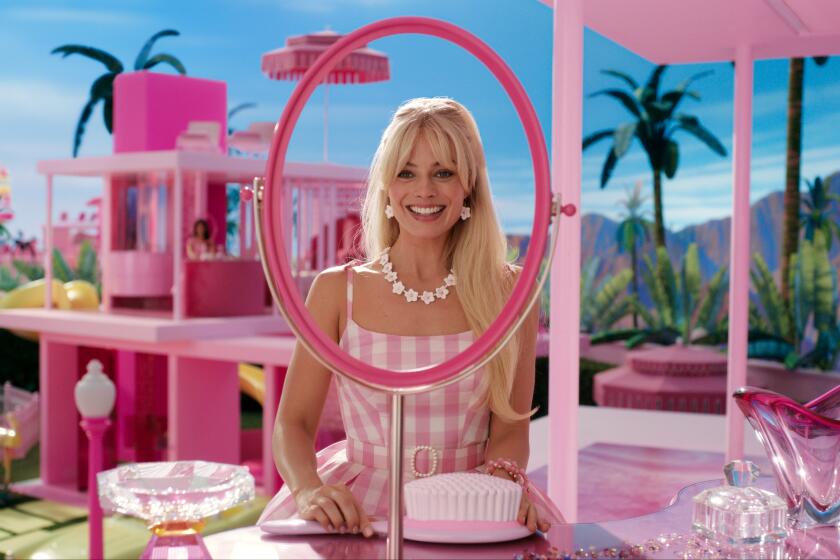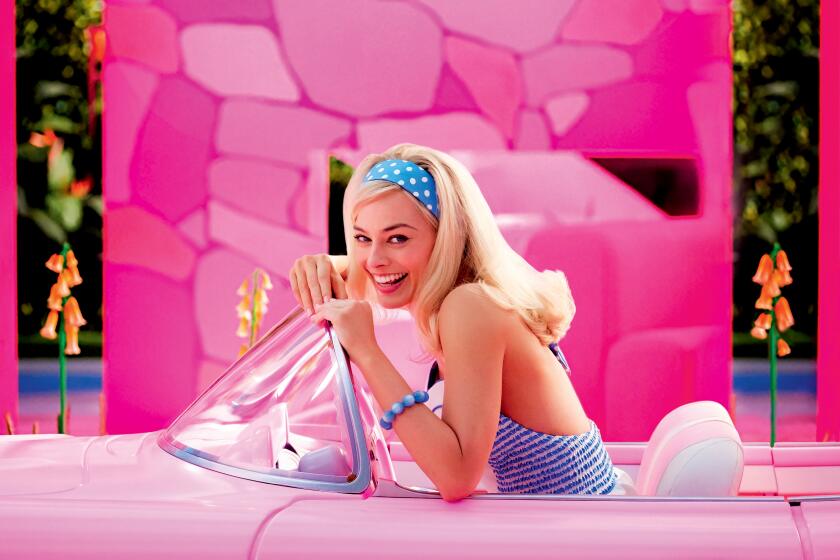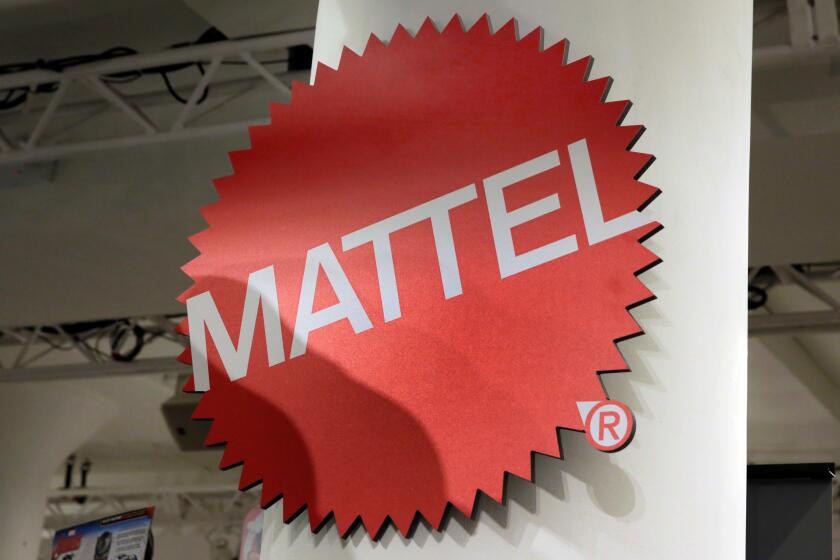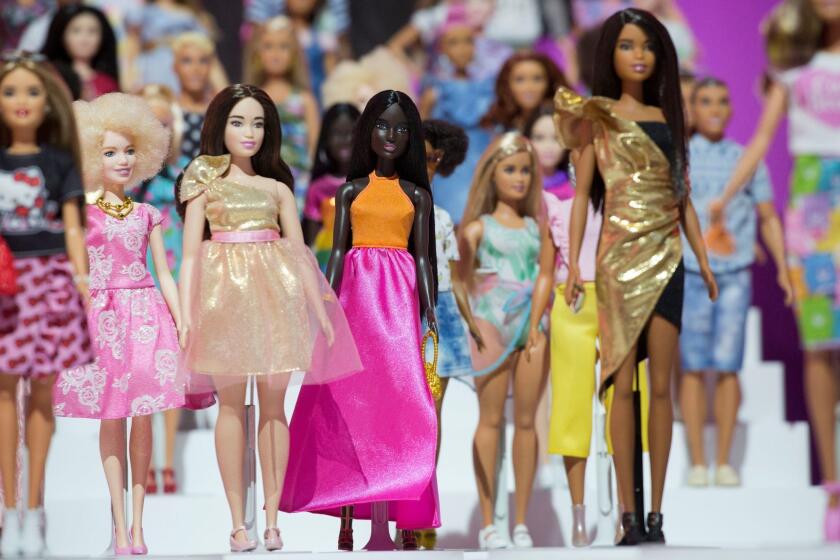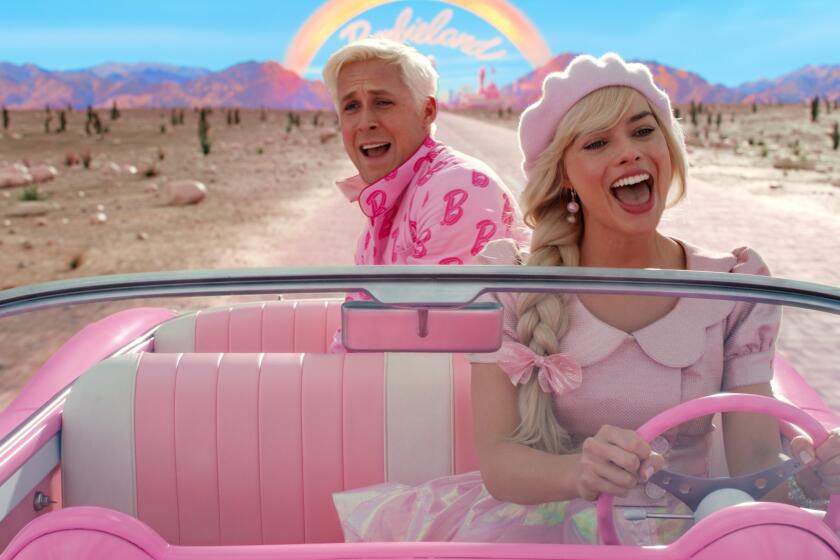- Share via
The day “Barbie” hit theaters in July, Mattel Chief Executive Ynon Kreiz was in New York City visiting his oldest daughter and the pair decided to walk to a nearby theater for some real-time market research. Kreiz, who had been the driving force behind the decision to bring Mattel’s iconic doll to life on the big screen, loved the film, but with its fate now in the hands of the ticket-buying public, his opinion didn’t much matter. He wanted to see how people were reacting.
His answer came quickly. As he and his daughter approached, they found themselves walking among droves of people dressed in Barbie’s signature pink. And when they poked their heads into each of the five packed theaters showing the movie, they were met with roars of laughter. Some viewers were crying.
Discover the changemakers who are shaping every cultural corner of Los Angeles. L.A. Influential brings you the moguls, politicians, artists and others telling the story of a city constantly in flux.
“Feeling that reaction — that audience reaction — was very telling,” he said, “and very exciting.”
What happened after opening night is now the stuff of Hollywood legend. The Greta Gerwig-directed film became an instant hit at the box office, raking in more than $1.4 billion, and kicked off a cultural phenomenon. Less well known, though, is the role the film has played in the story of Mattel’s revival. It’s a story that was written in large part by Kreiz, 59, who took the reins when the El Segundo-based company was struggling and who over his roughly six years at the helm has orchestrated a remarkable turnaround, making Mattel into one of the biggest corporate success stories of recent years.
At the heart of his plan was a move that seemed obvious to him, but which previous leaders had failed to execute: Mattel needed to make a splash in the film business. To Kreiz, Mattel’s intellectual property was a gold mine. The company had a roster of instantly recognizable characters beloved by children and adults alike that he was confident could become enormously lucrative if they were exploited wisely.
For skeptics, that remains a big if. Mattel, in need of a big win in a dark hour, understandably chose to come out of the gate with its most reliable brand. The question now is whether Barbie’s success earned the toy maker’s film division enough industry respect, and breathing room, for the studio to re-create last summer’s magic with other, less potent brands, such as Hot Wheels, Polly Pocket and the card game Uno. Complicating the already uncertain road ahead, earlier this year an activist investor began agitating for the company to jettison some of its key brands to boost its middling stock price.
The much-memed, long-awaited feature from director Greta Gerwig is a delightful comic fantasy that promotes and deconstructs its own Mattel doll brand.
“This is not a novel concept where you take a strong brand in one vertical and import it to others,” Kreiz said at a conference last fall. “At Mattel, we haven’t done it. … You have ‘Fast and Furious,’ 10, and Hot Wheels, zero.” He believes with certainty that there’s an audience for such a film. After all, Mattel already sells nearly 800 million of the die-cast cars a year.

Mattel’s consumers, Ynon Kreiz said, are more than just consumers — they are fans.
Kreiz, who gets up around 4:30 or 5 a.m. to kiteboard or get some other workout in before work, brings a similar intensity to the office. He stays impressively on message when talking about Mattel, with seemingly effortless sound bites ready at hand, barely breaking eye contact. Watch clips of his public speaking appearances and it becomes clear he repeats talking points, often word for word, his calm, personable demeanor disguising the discipline with which he approaches the CEO role.
When asked about the key to Mattel’s transformation under his leadership, Kreiz, unhurried and with animated hands, launched into a theory that he has often recounted in interviews. Mattel’s consumers, he said, are more than just consumers — they are fans.
“And when you have a lot of fans, you have an audience,” he said.
Kreiz became Mattel’s fourth chief executive in four years when he took charge, inheriting a company that needed a lifeline. He brought with him extensive experience in the entertainment industry, having made career stops at Fox Kids Europe, Endemol Group — the production company known for its unscripted programs, including “Deal or No Deal” and “Big Brother” — and Maker Studios, a short-form video studio that Disney acquired in 2014.
The two sides of “Barbie”: A vivid story about the social pressures on women, men and children; and the playful pink product marketing campaign.
The once dominant toy maker had lost its way: Some of Mattel’s biggest brands were struggling, and toy sales had been steadily declining since 2013. Its market cap had dipped more than $5 billion below that of rival Hasbro. Its second-largest customer, Toys R Us, filed for bankruptcy protection in 2017. That same year, Mattel reported a fourth-quarter loss of $281.3 million.
Kreiz needed to stop the bleeding. He restructured the company’s supply chain, reduced the number of items it produces by 35%, and cut five factories from its manufacturing lineup. The company slashed more than 2,200 jobs, 22% of its global nonmanufacturing workforce. Mattel was starting to move away from manufacturing and focus on developing its intellectual property, Kreiz told reporters. Between 2018 and 2021, Mattel said it achieved cost savings of more than a billion dollars.
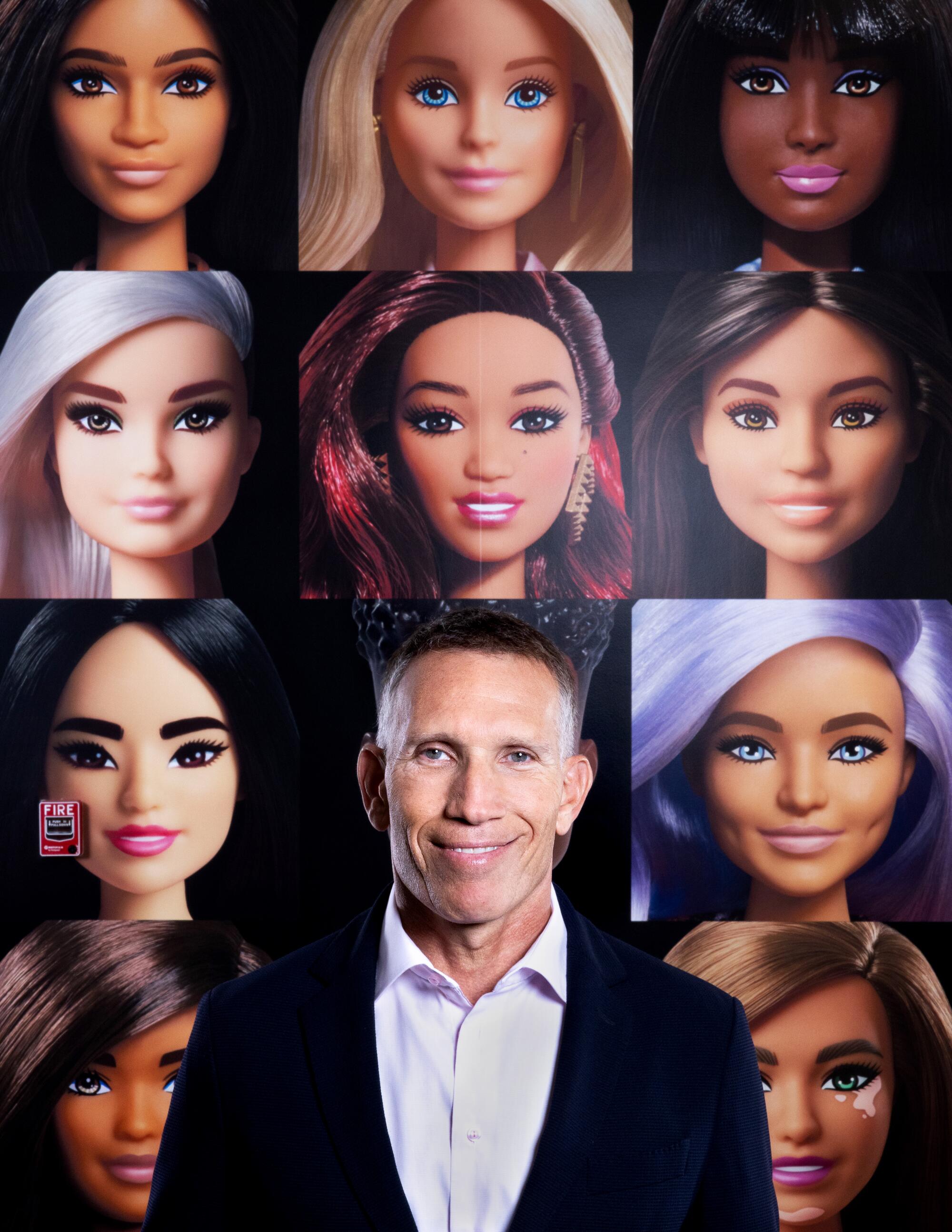
The Mattel of today looks much different from the company five years ago. The toy maker is now outpacing Hasbro and dominating in fast-growing toy categories, such as fashion dolls, which are more popular than action figures at the moment, said Linda Bolton Weiser, a managing director and senior research analyst at D.A. Davidson who tracks consumer goods.
Kreiz’s work at Mattel hasn’t gone unnoticed. With Barbie’s wild success, he and the turnaround he’d orchestrated became the talk of corporate Hollywood. Matt Belloni, an industry prognosticator, recently anointed Kreiz “the Hollywood hero of the year” and said he was an obvious choice to replace Bob Iger at Disney.
Toymaker Mattel Inc. told state officials that it would lay off 93 employees at its El Segundo headquarters as the company battles economic head winds and weakening consumer demand for toys.

When the first draft of the “Barbie” script landed in Kreiz’s inbox, he read it twice back to back. The text felt unconventional and special, and he loved it right away. Kreiz isn’t shy with his praise of Gerwig, often calling her a “creative genius.”
Robbie Brenner, the head of Mattel Films, felt the same.
Kreiz ‘is going to be able to go out there and get the best partners in Hollywood to do these future projects.’
— Linda Bolton Weiser, a managing director and senior research analyst at D.A. Davidson
Brenner, a producer who was nominated for an Academy Award for “Dallas Buyers Club,” was one of Kreiz’s first hires after starting as CEO. The two met at the Polo Lounge at the Beverly Hills Hotel after an agent suggested they connect.
“I mean, we hired Greta Gerwig for a reason, and you don’t hire Greta Gerwig and then try to cut her legs off,” Brenner added. “I think that we wanted her to fly and to tell an authentic, amazing personal story that was unique and different and bold, and surprise people.”
Mattel Inc. continued to shake off the liquidation of major customer Toys R Us Inc. and used aggressive cost-cutting to blow past Wall Street estimates during the fourth quarter, which included the crucial holiday shopping season.
The film was a hit beyond expectations, both financially and in the cultural consciousness. The “Barbenheimer” opening weekend brought crowds of people back into movie theaters in numbers unheard of since the pandemic. More than a dozen fashion brands launched “Barbie” collaborations, including Zara and Vans. Burger King in Brazil sold a hamburger doused in pink sauce and French fries called “Ken’s potatoes.” “Barbiecore” was everywhere.
The movie became the highest-grossing film of 2023, surpassing $1 billion at the global box office just 17 days after its release. At a conference in September, Anthony DiSilvestro, Mattel’s chief financial officer, said that the company expected $125 million in revenue related to the “Barbie” movie — including toy sales — with a profit margin of about 60%.
Mattel declined to comment on how much its cut of the box office revenue is, but industry analysts have said the company’s take-home pay from ticket sales is in the tens of millions. In addition, insiders with knowledge of the financial arrangement said that Mattel also will receive payments for owning the rights to Barbie’s intellectual property in addition to profits as a producer of the movie, the New York Times reported.
The toy aisle also felt the effects of “Barbie” mania. Mattel’s third-quarter performance beat estimates, with sales of Barbie dolls jumping 16%. The doll category as a whole was up 27% from the previous year.
The longer-term dividends the film will pay are harder to quantify but crucial to Mattel’s future.
“Barbie” has laid the groundwork for the future of Mattel’s entertainment sector, Bolton Weiser said. “[Kreiz] is going to be able to go out there and get the best partners in Hollywood to do these future projects. And it’s all good, you know? Very low risk for Mattel. They don’t take any big capital risks doing these entertainment events. So it all makes sense.”
Mattel Films now has 16 projects in development: A J.J. Abrams-produced Hot Wheels movie, Lily Collins and Lena Dunham signed on for Polly Pocket, and Vin Diesel as a partner for Rock ’Em Sock ’Em Robots, among others.
As the scale of “Barbie’s” success became clear, a question began to circulate: Can Mattel repeat this success story? Hollywood is a fickle beast, and the company’s use of its most resonant brand for its first act was a gamble.
“It’s difficult to imagine any other movie based on a toy ever reaching ‘Barbie’s’ heights,” Eliana Dockterman, who reviews TV and films for Time magazine, wrote in August. “Barbie is an icon. She has name recognition across the world equal to Mickey Mouse and Coca-Cola. And, sure, Hot Wheels may be popular, but won’t a Hot Wheels movie just be a racing movie, even if J.J. Abrams is at the helm as executive producer?”
Still, Dockterman admitted that she’s curious about Mattel’s next entertainment ventures, namely “Daniel Kaluuya’s involvement with what sounds like a very meta Barney movie (as in, yes, the big purple dinosaur); whether Lena Dunham can find a quirky take on Polly Pocket; and if a Magic 8 Ball horror movie can actually prove to be scary.”
Looking at her history and evolution, Barbie is clearly a strong, independent woman — the sort advocated by all four waves of feminism.
Kreiz quickly brushed off concerns of “Barbie” as a one-hit wonder. “We’re not saying that every movie will be as successful as ‘Barbie,’” he said, “but we absolutely look to have the same approach in terms of attracting and collaborating with the talent, supporting and backing the talent,” and enticing Mattel’s built-in fan base to the theater.
“The idea is to create something unique in every movie,” he added. “Every project has a unique purpose, and will have a unique voice.”

While “Barbie” captured fans’ collective imagination last year, Mattel’s future is not tied exclusively to films. Company execs like to joke that the nearly 800 million Hot Wheels sold annually make Mattel the biggest auto manufacturer in the world.
In September, the company unveiled a two-story L.A. flagship store for American Girl at the Westfield Century City Mall. On opening day, a line of toddlers to tweens, with dolls clutched to their chests and their parents in tow, lined up in front of the store’s doors. Inside, the cafe serves doll-sized pancakes on tiered serving trays alongside plates of human-sized ones. A hair and nail salon styles dolls and their humans.
But Kreiz’s big bet on entertainment is never far off. Mattel announced in December plans to give the American Girl brand its own Hollywood treatment with a live-action movie directed by Lindsey Anderson Beer. Some of the American Girls have already starred in movies, mostly direct-to-DVD and made-for-TV films, but the company is aiming to go bigger.
Barbiephobes might say I became a feminist despite Mattel’s sexist grooming. They probably never played with Barbie.
Nostalgia, tapped effectively, can be a powerful force at the box office. There is a reason why studios keep reaching for reboots and reimaginings of beloved franchises — fans want to reconnect with characters with whom they have a history. But it can be a tricky business trying to nail the sweet spot of familiarity and freshness.
Kreiz thinks the company is up to the task.
“Play is our language,” he said. “This is how we start the journey. This is how we speak to our fans.”

